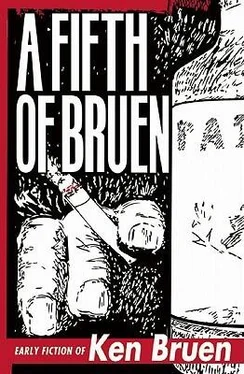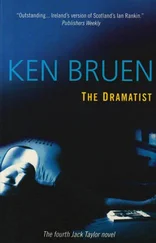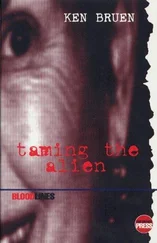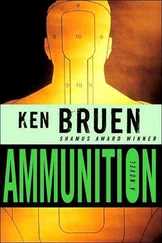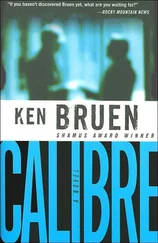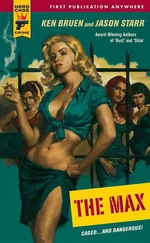“Let me know what he does for Valentine’s Day”, Ford said.
He had initially believed the tone he needed for social work was a light ironical one. This he adopted till a West Indian punched him in the mouth roaring, “Don’t get ironical with me sahib.”
On first arriving in London, Ford had made the big mistake of handling fruit at a vegetable stall. The owner came screaming and spitting bile and aggravation.
“ Never handle the fruit.”
Since then Ford had seen countless other fruit vendors achieve instant psychosis as some hapless foreigner touched their product.
He felt there should be a large billboard on the White Cliffs of Dover proclaiming “Don’t touch their fruit.”
Ford was big on control. Uneasiness gripped him when any area of his life slithered away. Yet he frequently drank heavily, thus forfeiting any personal direction. A lot of things got away from him then. Control definitely headed the pack. As the other faculties blurred, it leaped to win the stampede. Riddle him that.
Movies were his passion. Like Joseph Stalin, he had a penchant for the old American gangster stories. When men were men, and women were glad of it. He’d been to see Ordinary People and Judd Hirsch as the psychiatrist says, “I’m not big on control.” This soured that for Ford. He even read Judith Guest’s novel to see if that line was there. Oh sweet control! At such times Vikki spoke in his head. Ford once said “I love her because she loves me.” Not the worst reason, he thought as he’d thought so many times before. Without bitterness, and sometimes even without regret, he didn’t love anyone now. Not that heart-stopping, dizzying obsession that quakes your whole world. You didn’t know whether to sing or puke. Once — oh yes. But a long time ago. “It wouldn’t come again,” he said aloud. Moreover, he didn’t believe he had anymore what it took to rise to such heights. Such a level of one-dimensional obsession.
Ford didn’t figure it required youth as much as energy, and he was all out of energy. “God help us,” he added. This was an Irish benediction or condemnation, depending on your circumstances. Emotionally, Ford’s words were woesome and he sometimes realized it. Vikki would say “Sweetheart, if you’d listen to Leonard Cohen sing ‘Dance Me To the End of Love’ you’d be grand.” Maybe a lot of things, but he didn’t feel then or now that grand was one of them. Grand really applied to hotels or weather. He didn’t think you’d go far on grand emotions, not in South East London anyway.
On his fourth pint after work that Friday, Ford began to loosen up. Social work, jeez it was anything but social. His director, named Neville Whitlow, said a thousand times daily, “We can only try, children.” A pompous ass. Ford found him pretty trying. Children! For beggars sake! That a grown man would address his staff as that. Ford seethed anew.
Neville was from Suffolk and this explained a lot. “There were two types of Neville down there,” said Dalton on one of his rare visits. The Neville who stays put and the one who leaves. To be exactly identical in London. The director made the mistake of attempting to talk sensibly to Dalton.
“Are you a social worker, perchance, a socialite, mate?”
“Do you mean socialist?”
“Watch my lips, mate: now real S-L-O-W — socialite.”
That was that.
To calm himself, Ford dismissed all thoughts of work.
He liked to muse on great book titles. A few were outstanding. By Grand Central Station I Sat Down and Wept. Sure you’d have to grab that. He’d yet to meet a woman who didn’t love that title. In fact he’d yet to meet a woman. My Brilliant Career . Another cracker. Was she kidding, you thought. Irony. Right! Lay that ole irony down with a trowel and book awards yet mentioned. For his own book he’d title In Santorini I Greek Mis-spelt Your Name . Get the yuppies and the sour-ass romantics. The greek-o-philes would nod knowingly and shell out. Powerhouse Sex . In truth to tell, he’d sell it thus. Big red letters on a black jacket. Nowt else. Full of plunging and ravaging with buttocks heaving and bosoms hopping. Big buckets of sweat and grunting. ‘She felt his manhood throb’ type passages. Ford’s own favorite was “love weapon” pronounced with a slight slur. “She unsheathed his love weapon.” Not the easiest line to mutter with a straight face. Let’s get down to fierce basics, thought Ford. The hero would be named Ramrod. Then Ford’s mood darkened as the jukebox played Willie Nelson’s “Loving Her Was Easier”. Next would come ole Waylon Jennings. Ah, stab my unprotected heart. Tis a while since he’d felt anything throbbing at all.
Heading for the subway at The Elephant and Castle, he had that fragile feeling where you walk very, very carefully. Like a drunk, in fact. “Who, me?” Never, Neville! “When you’re tired of London, you’re tired of life.” Whoever wrote that, had never traveled on the Northern line. The elevator was out of order. Well knackered from the stairs, Ford leaned on the platform pillar. Two skinheads were rough-housing. As the train approached Ford whispered, “Play well children,” and hiccuped merrily. The skinheads suddenly raced towards him, and one shot him a kick in the groin.
“Score one for Milwall,” he roared.
The Doc Marten had a steel toe, and Ford dropped like a felled tree. The train pulled off as Ford lay whimpering.
“I throb,” he thought. His love weapon crushed.
Then there was what Ford termed Dalton’s political conversation. Dalton claimed to have met an ex-Prime Minister on a train. If bodyguards were present, they had achieved an invisible profile. Dalton approached the man and he was receptive, even friendly. Perhaps he feared public indifference more than political danger. He spoke at length and Dalton managed an almost fine pretence of interest. Eventually, Dalton proposed a drink and borrowed a twenty from the man.
“Bit short on the readies, wife in the hospital, etc.”
“So,” asked Ford, “did you buy him the drink?”
“Of course. A ginger ale, mind. He had an image to portray. I didn’t rejoin him. Lord no, but I said I’d get the money to him when the country got back on its feet. I left him to his ginger ale alone as I reckoned he’d a future behind him and might welcome some introspection if not downright reflection.”
This way as unlikely a yarn as Ford had ever heard, even from the likes of Dalton. Dalton’s credo was simple, based loosely on Henry Thoreau’s: “Beware of any enterprise that requires new clothes.”
“Look,” he said to Ford, “everything is about dealing. God doesn’t give you any class. OK, then maybe deal with the devil for a bit of style.”
He pronounced devil as divil and not always intentionally.
“Is this a true story?”
“Whaddya mean?”
“Well, there are some flaws in there.”
“What, what friggin flaws? You don’t believe I subbed the money?”
“Oh not, that’s all too believable. It’s the ex-Prime Minister on a train bit.” Ford paused, considered, then risked, “Had a season ticket, did he?”
Dalton was livid. “You scummy bastard! He’s a man of the people, why wouldn’t he take trains? Anyroad, what do you care if it’s true, you enjoyed the story or what?”
“Yes.”
“So, where’s the problem? Picking up some integrity in the social work field, are we? Time was, Ford, you’d just enjoy a story. Now you need references. Jeez man, why do you care? Leave the caring to the Nevilles.”
“Listen, Dalton, I love the story but I do care.”
“It’s that I kind of need it to be true.”
“Ah, for crying out loud! You ludrimawn, you’re W-E-I-R-D. Gottit? You remind me of that biblical fellah — what’s his name? Jot?”
Читать дальше
